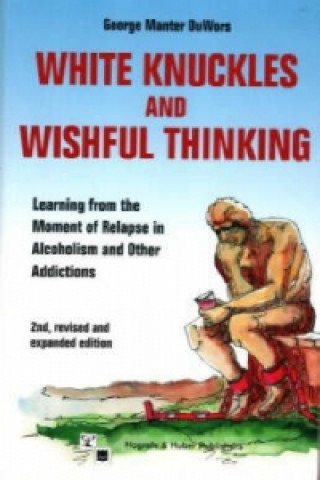
Kod: 04755299
White Knuckles and Wishful Thinking
Autor George DuWors
This book aims to explain the moment of relapse, and to provide practical help for counsellors and clients struggling to avoid relapse. The ideas and techniques are compatible with the Alcoholics Anonymous and other 12-Step progra ... więcej
- Język:
 Angielski
Angielski - Oprawa: Miękka
- Liczba stron: 400
Wydawca: Hogrefe & Huber, 2000
- Więcej informacji o książce

Zobacz książki o podobnej tematyce
-

Dune
50.32 zł -3 % -

Haunting Adeline
125.47 zł -1 % -

Berserk Deluxe Volume 2
212.67 zł -1 % -

White Nights
10.94 zł -28 % -

Powerless
48.61 zł -11 % -

Atomic Habits
57.35 zł -28 % -

Dune Messiah
46.20 zł -3 % -

Berserk Deluxe Volume 3
217.79 zł -3 % -

One Day
34.25 zł -44 % -

Berserk Deluxe Volume 1
211.26 zł -2 % -

Iron Flame
60.97 zł -28 % -

Surrounded by Idiots
36.66 zł -28 % -

Harry Potter and the Prisoner of Azkaban (Minalima Edition)
169.97 zł -2 % -

Gravity Falls Journal 3
89 zł -

Heaven Official's Blessing: Tian Guan Ci Fu (Novel) Vol. 1
86.99 zł -3 % -

The Creative Act
102.66 zł -12 % -

Dune
47.21 zł -23 % -

Hunting Adeline
125.97 zł -4 % -

A Little Life
48.61 zł -11 % -

Children of Dune
46.61 zł -2 % -

Heaven Official's Blessing: Tian Guan Ci Fu (Novel) Vol. 2
77.55 zł -14 %
Powiadomienie o dostępności
Wpisz swój adres e-mail, aby otrzymać od nas powiadomienie,
gdy książka będzie dostępna. Proste, prawda?
Więcej informacji o White Knuckles and Wishful Thinking
 Opis
Opis
This book aims to explain the moment of relapse, and to provide practical help for counsellors and clients struggling to avoid relapse. The ideas and techniques are compatible with the Alcoholics Anonymous and other 12-Step programmes. DuWors explores the one relentless empirical fact about addictive relapse: at the moment of picking up the first drink/drug we all say one of two things - either "One won't hurt" (or a handful of "wishful" variations) or "Who cares?" (or a smaller, less frequent list of "white knuckle" variations). What does this mean? Why is it that so many different people - different addictions, different stages of the illness, different educational and cultural backgrounds - all say the same thing at this critical moment? After all, this is the very moment that treatment and recovery strive to prevent. And if we could understand it, might we not help more people not have to repeat it? This book comes to the conclusion we have to try and enter the psychic world of the person living it, as well as the perspective of the would-be helper. Like the author, we must sift through psychological and biological theory. But the theories mean nothing if they do not connect with human experience. The book is written for three main groups: (1) professionals and others fighting on the chemical dependency front; (2) trainees seeking to join the fray and their teachers; and (3) clients whose counsellors recommend it. Two specific relapse experiences are the main focus of this approach: (1) exactly how to deal with the actual moment and process of relapse itself; and (2) how the addict looks at himself before and after drinking, and how this "split" plays a key role in perpetuating relapse and blocking recovery. There is one "nuclear" chapter for understanding the "wishful" relapse and another for the "white knuckle" relapse. You will find three chapters on denial, how it functions up to the moment of relapse. You will find three chapters on acceptance - what it is, how it happens, how it prevents relapse. All of the chapters specify tools for talking to self or others about the experience of relapse and how to prevent it from happening again. The relationship between recovery and spirituality is clearly spelled out in terms of the actual relapse experience. The 2nd edition introduces the SPARROW model for coping, for taking the "serenity prayer" down off the wall and putting it to work. Each chapter features study guides for students of chemical dependency and treatment exercises for those struggling with their own relapse.
 Szczegóły książki
Szczegóły książki
Kategoria Książki po angielsku Society & social sciences Society & culture: general Social issues & processes
- Pełny tytuł: White Knuckles and Wishful Thinking
- Autor: George DuWors
- Język:
 Angielski
Angielski - Oprawa: Miękka
- Liczba stron: 400
- EAN: 9780889372245
- ID: 04755299
- Wydawca: Hogrefe & Huber
- Wymiary: 210 × 150 mm
- Data wydania: 01. January 2000
zadowolonych klientów
Od roku 2008 obsłużyliśmy wielu miłośników książek, ale dla nas każdy był tym wyjątkowym.
Copyright! ©2008-24 libristo.pl Wszelkie prawa zastrzeżonePrywatnieCookies



 21 milionów książek
21 milionów książek Dostawa 10.99 zł
Dostawa 10.99 zł (32) 444 93 66 (8-15.30h)
(32) 444 93 66 (8-15.30h)